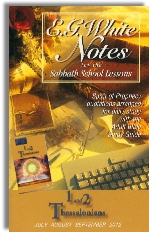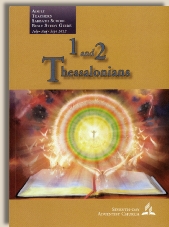|
||||||||||||||
Commentary on "Joyous and Thankful"
Day 2: Sunday, July 22, 2012 - A Prayer of Thanks (1 Thess. 1:13)
Overview
After some further background information about names and definitions, the lesson author continues draw lessons from Thessalonians 1 on practical Christian living. He states, “Paul concentrates on reality, not giddy spirituality. Faith provokes serious work.” What he means by “giddy spirituality” is not explained, but he continues, “Genuine love produces much labor. And hope requires much patience. The stress in these words is on action, not abstract ideas.”
Observations
In this lesson, we are to avoid “giddy spirituality” and abstract ideas, for these are obstacles to genuine, enduring actions. We should think of faith, hope, and love as deliberate, external behaviors that others can see. Throughout his lessons, Paulien uses expressions such as “real-life evidence,” “visible and outward sign,” and “real” to describe these Christian attributes. By removing the “spirituality” and “abstract ideas” that show deeper reasons for these virtues, aren’t we just left with just ordinary, everyday good behaviors? Are ordinary virtues that anyone can exercise under the right circumstances still Christian virtues?
Charles Finney believed Christian virtues are ordinary behaviors, and stated that although the Holy Spirit has some agency in holy living, “there is nothing in religion beyond the ordinary powers of nature. It consists entirely in the right exercise of the powers of nature.” Religious believers “only exert the powers they had before in a different way, and use them for the glory of God.” According to Finney, faith, hope, and love are ordinary virtues that anyone can practice if they choose—with an occasional nudge from the Spirit, of course. Holiness really comes down to just practicing common decency and good psychology. This lesson and the Reverend Finney appear to share these assumptions of a naturalistic kind of morality. However, naturalism studies the mind while denying the realm of spirit.
Paul and the New Testament have a very different view faith, hope, and love. As Paul showed, these three traits aren’t naturally part of us. They are fruits of the Spirit, which does not mean that they are the actions of our natural powers—all the Spirit has to do is stimulate them into action. However, when Paul speaks of faith, hope, and love, he makes it clear; “giddy” or not, these things come from God who is spirit, and they are not of this world.
Faith is a miraculous gift of the Spirit, it doesn’t come from us. “For by grace you have been saved through faith. And this is not your own doing; it is the gift of God…” (Eph 2:8). Is faith just an action word, something we do? No, and Paul anticipated that question in vs. 9: “…not a result of works, so that no one may boast.” It also comes when hear the gospel in the word, and the Spirit awakens our spirits with Christ’s resurrection life and power. Before that happens, we are no more capable of generating faith in ourselves than is a corpse.
Hope is given to us in the New Covenant promises, for these promises are certain:
“I will make with them an everlasting covenant, that I will not turn away from doing good to them. And I will put the fear of me in their hearts, that they may not turn from me.” Jeremiah 32:40
Here, God takes responsibility for putting the fear of Him in us and making sure we don’t turn away from Him. Hope for the Christian is having Spirit-given confidence in God’s sovereign grace, believing His promises that He won’t turn away from us. It is He who will change our hearts so that we will keep that hope, and won’t turn from Him. He has guaranteed it. Naturally, we don’t want to depend on His promises and live by hope; we want to depend on ourselves. That’s why he guarantees a new heart:
“I will put my Spirit within you, and cause you to walk in my statutes and be careful to observe my commandments.” Ezekiel 36:27
“But,” you say, “We have to fit for heaven, and that is something that depends on me, and my choices. Which would you rather bank on: your wobbly, weak will, or His rock-solid promises, to make your ready for Heaven? Paul says,
"Christ shall confirm you to the end, blameless in the day of our Lord Jesus Christ. God is faithful, by whom you were called into the fellowship of his Son." I Corinthians 1:8-9
My friend, it is God who works in you, both to will, and to do (Phil. 4:13). We have this hope because He said so. We don’t endure until the end in order to be saved; we endure to the end because He has given us the assurance that we have been saved.
"He who calls you is faithful, and he WILL do it!" (1 Thessalonians 5:24).
Love is number one on the list of the fruits of the Spirit. Love for others in the Agape sense is simply not possible for the unregenerate man, no matter how good his therapist is!
“Beloved, let us love one another, for love is from God, and whoever loves has been born of God and knows God.” I John 4:7
My natural self likes the idea of love, as long as it doesn’t cost too much and it makes me look good. That is why good psychology is never enough. Agape is a self-sacrificing divine love, the kind that drove Jesus to the cross, and that He promises to give us when we are born again and given His life:
“By this we know love, that he laid down his life for us, and we ought to lay down our lives for the brothers.” I John 3:16
That is an impossibly high standard of love. These are not ordinary gifts that we can ever achieve by human efforts or will. Paulien is right in wanting to see action, but he failed to show the deep spiritual nature and source of these gifts. The gospel gives us so much more that mere good behaviors. Faith, hope, and love are supernatural gifts that produce real fruit, and can only come from the Spirit. They are promised by the new covenant and paid for with blood.
Copyright 2012 BibleStudiesForAdventists.com. All rights reserved. Revised July 21, 2012. This website is published by Life Assurance Ministries, Camp Verde, Arizona, USA, the publisher of Proclamation! Magazine. Contact email: BibleStudiesForAdventists@gmail.com.
The Sabbath School Bible Study Guide and the corresponding E.G. White Notes are published by Pacific Press Publishing Association, which is owned and operated by the Seventh-day Adventist church. The current quarter's editions are pictured above.
Official Adventist Resources
Standard Edition Study Guide Week 4
Teacher's Edition Study Guide Week 4
Easy Reading Edition Study Guide Wk 4
Search the Complete Published Ellen G. White Writings
Please Support This Project


